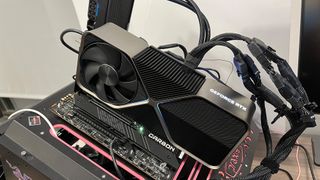Nvidia could be doing something very different with the RTX 5090 Founders Edition compared to its previous flagship GPU, and the result might just be a thinner graphics card – which would definitely be a good thing, given how bulky high-end models have got these days.
VideoCardz picked up on a couple of pieces of speculation here, the first of which is that the video memory configuration of the 5090 will be very different, as claimed by Panzerlied, a leaker on Chiphell (and we’d sprinkle plenty of seasoning on this).
We’re told the VRAM (rumored to be GDDR7) will be more densely packed to facilitate having more memory – up to 16 chips in fact (rather than 12), hooked up via a 512-bit bus as previously rumored.
Panzerlied further reckons that Nvidia will split the RTX 5090 into three PCBs or printed circuit boards.
Another leaker on X (formerly Twitter), Kopite7kimi chimes in here, backing up this theory, and expanding on it to claim that there’ll be one main board (with the core components, GPU and memory modules), an I/O board (inputs and outputs, display controllers) and a separate board for the PCIe slot. (Mind you, the latter may be tiny – as Kopite7kimi points out, it may not even be considered as a third PCB).
Kopite7kimi also elaborates on the GPU, which will apparently be a monolithic chip, but consisting of two connected GPU clusters. However, there are no real details on exactly how this might work, or if it could have any negative ramifications for PC gaming – if the RTX 5090 has been designed for more heavyweight work, that is (though you’d hope this wouldn’t be the case).

As you can see, the design is quite different, if all these rumors pan out. Certainly there’s been quite a bit of chatter already that Nvidia will run with a 512-bit memory bus (and GDDR7) on the RTX 5090, and so the new speculation makes sense in that light.
In theory, with 16 memory modules, if Nvidia sticks to the 2GB size, the RTX 5090 could run with 32GB of VRAM if it has the full complement of chips. Although just because there’s space for 16 modules doesn’t mean Team Green has to populate them all.
As to the new PCB design, that could have major implications for cooling. Panzerlied even hinted that Nvidia could be looking at a dual slot cooling solution for the RTX 5090, and that would be a major change. In short, the Blackwell flagship could be a somewhat trimmer graphics card than the RTX 4090, and that’d be great news for those wanting to fit the next-gen GPU in a more modest PC case.
How the idea of a slimmer RTX 5090 marries with whatever Nvidia’s plans are to ramp up performance, by quite some margin perhaps – and how much wattage the Blackwell top dog might chug down – that we don’t know, but color us intrigued at this latest twist in the thread of rumors.
The obvious worry is the potential cost of the RTX 5090, of course, if it pushes to 32GB of GDDR7 VRAM and comes with a big performance leap as previously rumored – but more eyes may be on the RTX 5080, mind, which may well arrive first anyhow.